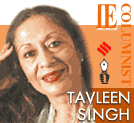Tavleen Singh Journalist and Political Reporter

New Delhi: Dec, 1997
Back in 1969-70, a young lady joined the Journalism course at the New Delhi Polytechnic--just because it was the shortest course available.
Today, that same lady runs two syndicated columns, one of which has been recently grabbed by India's most recent weekly, India Today, for a sum that was ``just too good an offer to refuse'' and has embarked on a career in TV with a celebrity profile show, Ek Din Ek Jeewan (Star Plus). The programme, which featured Deve Gowda and Sitaram Kesri in its first episodes, is all set to become a weekly affair from 20th July.
Her name? Tavleen Singh.
Tavleen had been going around with the concept of Ek Din Ek Jeewan in her pocket for around five years before Star Plus finally helped her give it a concrete shape. ``I, obviously, went to DD first. But they just didn't fancy the idea.''
That's not to say that she is too happy with the way the programme is shaping up now. ``The channel, at the moment, is keen on us featuring mainly politicians. That's sad, because some of the other celebrity profiles have turned out so well,'' says Singh, ``For instance, I regard the episode on M.F. Hussain to be a complete portrait of him on celluloid. But I am hoping for an extension and including other interesting people in the show. Just now we have a contract for 13 episodes.''
So far, it's been quite a journey for this journalist who zoomed out of her ``short'' journalism course only to find that ``there weren't enough jobs and there were hardly any women in the field''. And who was, subsequently, pushed into another kind of a job which also dealt with pen, paper and writing--that of a secretary.
Singh was so ``hopeless'' at it that her English employer was forced to ask her what it was that she actually hoped to do in life. When the lady bared her preference for the noble profession of journalism, the gentleman suggested she try for a short-term course in England. Singh stayed there for two-and-a-half years, studying and working for evening papers. But upon returning to India, she realised that even the firang connection was not quite enough to ensure her a job instantly. ``I had to wait for a year before I got a job at the Statesman in 1975,'' she recalls. ``I got a major shock when I got back to India. It seemed so primitive. People wrote in an old-fashioned way,'' Singh adds.
However, Indira Gandhi and her infamous Emergency changed the scenario. ``That phase changed journalism in India. The magazines came in, there were more jobs, more avenues,'' she says. Thereafter, Tavleen joined the Telegraph in the early 80s, then switched to foreign papers like the Sunday Times and freelancing (``to give more time to my family and to raise my son'') and finally to writing syndicated columns.
But inspite of all the name, fame, and fortune she earned in the print media, Singh always wanted to get involved in TV journalism: ``When I was in England, BBC made me an offer to anchor a show. I did a show for DD on dowry deaths. But at that time TV was such a closed medium. DD just wanted nice, safe shows on flower-arrangements and the like. Satellite TV has changed all that.''
Not many of us remember this, but Singh was with Plus Channel and its Business Plus and did a story for the first episode of The World This Week from Pakistan.
But, at the moment, Tavleen is not sure of her own plans. ``I don't plan for the future, but I do hope to write many more books,'' she says. Right now, she is busy with her latest book that ``expresses the irritation of my post-midnight generation at the lack of analysis of political events of the country''. Till then, you can see her analysing people on TV.